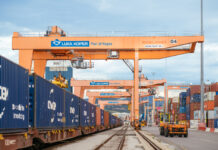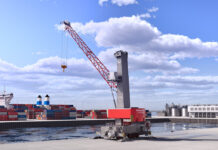
Studies by Maersk into the effectiveness of its own Destination Cargo Management (DCM) programme point to a 50% reduction in exposure to unwanted demurrage and detention (D&D) costs by shippers using the system.
Based on studies that looked at 1.2 million containers moved in North America from 2019 and 2020, the research concluded that DCM-managed customers experienced less than half the D&D cost exposure compared to non-DCM customers.
[s2If is_user_logged_in()]Demurrage fees have become a hotly contested topic in the last six months as a result of the severe congestion being felt across the US port system. An investigation into the matter has been opened by the Federal Maritime Commission after a powerful alliance of truckers, freight forwarders and shippers have complained about being left to pick up the bill for congestion in US ports.
Members of the Harbor Trucking Association, the Agriculture Transportation Coalition, and the Pacific Coast Council of Freight Forwarders and Customs Brokers argued that demurrage fees that have reached US$100 million in Los Angeles/Long Beach and US$50 million in New York last year prompting some concessions from carriers on the matter.
Maersk has been working with the Harbor Trucking Association to improve the situation in the ports of Los Angeles and Long Beach.
The latest research was undertaken independently of the ongoing collaboration with trucking companies but offers an upstream solution to the problems being felt in the ports.
“The trucking industry is challenged with surging container volumes and a lack of drivers to keep pace with the demand,” said Mark Venard, the Head of Maersk’s DCM unit in the US. “The industry is fragmented with 95% of the trucking companies having fewer than 20 drivers and oftentimes lacking sufficient IT systems. To address this, Maersk is working with truckers to onboard them to TradeLens, an industry-backed platform where all uploaded documents are underpinned by blockchain technology, as a way to overcome their IT roadblocks, lack of resources, and offer access to new visibility and optimization technologies.”
The former platoon commander, Venard, brought his military experience to the matter of supply chain disruptions in the system.
“Changes and disruption are inevitable in supply chains – especially near the destination. So we’ve geared the system to show us early warning signs and ways to stay agile with decision-making and viable routing options. It’s cool to see the end-to-end performance come together for customers who are dealing with a constantly-changing flow of goods, consumer buying patterns and a faster-paced business cycle,” said Venard.
Rainbow Nelson
Americas Correspondent
[/s2If]
[s2If !is_user_logged_in()]Please login or register to read the rest of the story[/s2If]




